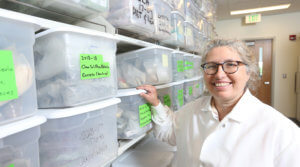Behind the Research: Patricia Jaynes
About the feature
Many people are involved in the remarkable range of programs, services and facilities that undergird research in the College of Agriculture. Collectively they’re integral to the college fulfilling its research mission. “Behind the Research” explores their individual roles. Each academic year, we profile six people whose work supports the College of Agriculture’s global reputation for developing innovative, multidisciplinary solutions to challenges and then putting those solutions into action.
Patricia Jaynes, Laboratory Technician VIII, Animal Sciences
Pat Jaynes grew up on a poultry farm in east Tippecanoe County and came to Purdue as an undergraduate biology major. She had worked at the Agronomy Farm in high school and made some contacts in Botany and Plant Pathology, so her first job after graduating in 1986 was as a lab technician with that department. A year later she moved to Animal Sciences and worked with Drs. Bill Muir and John Patterson. In Muir’s genetic sequencing lab, Jaynes provided a valuable service to the university, but she missed interacting with students. “I realized that I needed my connection to graduate programs and their research projects,” she says.
She had earned a master’s degree in early childhood education in 1995 as a foundation for starting a childcare center. “I had been considering it before I finished my BS in biology,” she says. “But in terms of actually switching careers, staying with graduate students became more important to me.”
 So in 2000 Jaynes became manager of the monogastric nutrition lab of former Purdue faculty member Todd Applegate and Layi Adeola, professor of animal sciences. Today the Adeola lab focuses on nutrition in pigs and chickens. “We’re trying to get them to market weight as quickly as possible while considering their health and environmental impact,” Jaynes explains. In addition to handling the logistics of experiments, she lines up undergraduate support for graduate students’ research and coordinates analyses. Organization and communication skills are critical to keeping experiments running smoothly, Jaynes says.
So in 2000 Jaynes became manager of the monogastric nutrition lab of former Purdue faculty member Todd Applegate and Layi Adeola, professor of animal sciences. Today the Adeola lab focuses on nutrition in pigs and chickens. “We’re trying to get them to market weight as quickly as possible while considering their health and environmental impact,” Jaynes explains. In addition to handling the logistics of experiments, she lines up undergraduate support for graduate students’ research and coordinates analyses. Organization and communication skills are critical to keeping experiments running smoothly, Jaynes says.
Some of the practical challenges she faces on the job — coordinating the use of equipment that multiple people need, or scrambling when a piece of equipment fails — can feel a little overwhelming, she says. “But the nutrition group has always worked well together,” she adds. And Animal Sciences’ new facility is especially conducive to collaboration: “Now it’s one, big, open lab, but we all know how to share.”
While Jaynes works specifically with Adeola’s graduate students, her job has expanded over time to include solving problems department-wide. Her collaborations across agronomy, botany, and food and nutrition have enabled her to build useful networks. “Having experience helps out a lot in trying to find a way to help,” she says. “And if I can’t, I suggest other people, either in the department or outside resources.”
Her favorite part of the job is her daily interaction with students as they come to appreciate the lab experience. “As students integrate what they’ve learned in the classroom to what we do in the lab, they acknowledge, ‘I didn’t realize what all went into the research we do,’” Jaynes says. “A lot of wonderful things happen in research, but students learn from the little disappointments, too. Great discoveries are good, but it’s not a perfect path all the time.”
That’s an important lesson in the real world, she adds: “I know that their experience here gives them a life skills set for research that they can take with them and apply in academia or private industry. Through the Animal Sciences faculty, Jaynes follows students’ careers and uses their successes to encourage the next “generation.”